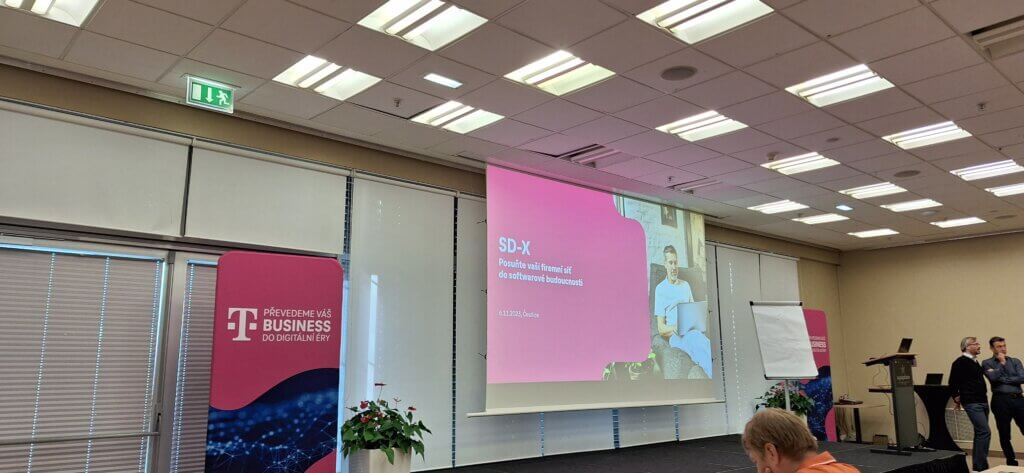What does software-defined networking (SDN) enable?
In a three-person group we attended a T-Mobile lecture on enterprise software-defined networking (SDN) / software-defined access (SD-x), which took place at the Aquapalace Hotel in Čestlice. On behalf of TRITON IT and our sister companies, we thank T-Mobile for the invitation and for broadening our horizons. In the following note we will briefly describe what SDN is, what it is used for, what it brings to companies and why we at TRITON IT are interested in this technology.

What is software-defined networking (SDN)?
SDN is a modern approach to managing and configuring network devices using software. This technology enables centralized network management and separates the management role from data transmission. This has several advantages, including increased flexibility, automation and the ability to respond quickly to changes in network traffic. SDN allows you to manage..
- managed LAN (Local Area Network), i.e., all network infrastructure within a single location - for example, a client's branch office. This streamlines network operations within a single branch office.
- software-defined Wide Area Network(WAN ). Using SDN technology, data traffic between remote branches or locations can be centrally managed and optimized. SD-WAN enables dynamic routing of data traffic based on current network conditions, resulting in improved performance and reduced WAN traffic costs.
- configure IP VPNs, which are private virtual networks built on the public Internet or other public networks. SDN enables centralized management of these networks, making it easier to configure, monitor, and secure VPN connections.
- managed firewall - a service that protects network traffic from unauthorized access and threats. With SDN, firewall rules can be centrally managed and updated and respond to new threats in real time.
More humanly speaking?
Imagine a company that has N branches. Within each branch, it has a local LAN set up. The branch offices are connected to each other on a single corporate WAN, and the home office people connect to that. A VPN is used to ensure secure communication. In addition, the branches are protected against attacks from outside by firewalls. SDN allows this to be combined into a single solution, which T-Mobile designs and then delivers turnkey as part of the presales process. From one place, the company can monitor behaviour on its network and perform network configuration. The solution is operated and serviced under a monthly SLA. SDN is therefore a solution to increase the reliability of the corporate LAN/WAN and reduce the associated operating costs.
SDN as a solution for small business?
From the above description, it may seem that SDx will find application exclusively for large companies that need to optimize traffic across multiple branch offices. And also that SDN must cost a rocket. Not so. We were very interested in the case study of an ice cream parlour in Nymburk, which T-Mobile presented to us. The ice-cream parlour has a seating area for guests with free WiFI, monitoring of the guest area with a security camera, an electronic POS system, and facilities for managers with a computer. The entire branch is remotely monitored using the Cisco Meraki web application, which can easily add additional branches should the ice cream parlor expand in the future. T-Mobile took care of the entire setup from A to Z. And we were told that the price of the whole package is around CZK 1,000 per month including high-speed internet connection.
Why were we interested in SDN technology and what did we take away from the lecture?
The case study of an ice cream parlour in Nymburk reminded us of our recent project. We were involved in building a restaurant and café in Prague. TRITON IT was responsible for the construction of the website, online marketing, as well as the complete HW and SW equipment of the café. This included arranging an internet connection, selecting and configuring a suitable switch, setting up the LAN, sizing the connectivity for a sufficient number of guests (up to 150 at full operation), deploying APs for WiFI around the restaurant, checking availability in all parts of the atypical space, connecting the POS system and staff computers, and securing the network. In case of complications, arrive, diagnose the situation and take corrective action. Progressively train the designated maintenance staff person.
At TRITON IT, we build on a strong technical foundation. We see our background in IT as an added value for marketing and, conversely, our years of experience in marketing separate us from traditional IT companies, which often tend to focus on specific challenges rather than the PNO of the entire solution for the client. That is why we are glad that we now know about T-Mobile's SDN offering and are able to recommend it to our clients the moment we assess that it is a time/ cost effective option.